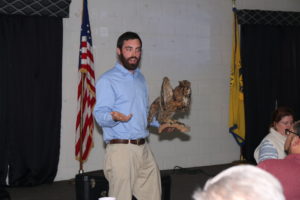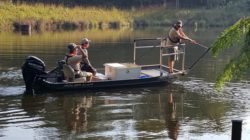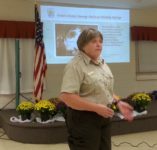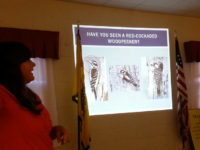April 2022 Guest Speaker
 The guest speaker for the April 20th member’s meeting was Kevin Cornwell. Kevin is a Wildlife … Read more
The guest speaker for the April 20th member’s meeting was Kevin Cornwell. Kevin is a Wildlife … Read more
 The guest speaker for the April 20th member’s meeting was Kevin Cornwell. Kevin is a Wildlife … Read more
The guest speaker for the April 20th member’s meeting was Kevin Cornwell. Kevin is a Wildlife … Read more

The chapter held it’s first member’s meeting in over a year at the park on Saturday. The weather was perfect and best of all, no masks were required! Everyone brought a picnic lunch and enjoyed a great afternoon catching up with current members and getting to know some new members. … Read more
Submitted by: Tim Doxey, Treasurer, Chair of Awards, SOS/Clean Water Liaison, Media Outreach, Awards, and Budget committees; Source Credit: ncwildlife.org
The U.S. Fish and Wildlife Service has created an informational webpage dedicated to what to do if you have purchased aquatic moss balls in the past month. DESTROY! DON’T DUMP! … Read more
Article Submitted by Chapter Ike Rob Carpenter (board member, chair of archery and outdoor ethics committees, and youth coordinator).
Since Spring Turkey Season starts next month, I thought it would be a good idea to talk about some of the safeties you should be aware of while hunting Gobbler. Season … Read more
 The guest speaker for our March 20th member’s dinner meeting was Chris Prohaska. … Read more
The guest speaker for our March 20th member’s dinner meeting was Chris Prohaska. … Read more

On September28th, Department of Game and Inland Fisheries biologist, Chad Boyce, and his partner Jared, collected representative fish samples from our pond. This consisted of electro-fishing (shocking), collecting the fish and then counting, weighing and measuring each species. This information will be used to formulate recommendations to assist our chapter … Read more

The guest speaker at our September Banquet meeting was Deloras Freeman. She is a Visitor Specialist at the Great Dismal Swamp National Wildlife Refuge. Deloras and her family have lived in Chesapeake, near the eastern boundary of the refuge, for 34 years. The title of her presentation was “The Great … Read more

Our chapter’s guest speaker at the July member’s meeting was Ms. Kelly Morris. Kelly is a wildlife biologist with the U.S. Fish and Wildlife Service working at the Great Dismal Swamp Wildlife Refuge. Her presentation consisted of an overview of the Red-cockaded Woodpecker (RCW) Recovery Program and specifically the project … Read more
 Neonicotinoics (or neonics) are a powerful class of pesticides used on many crops.
Neonicotinoics (or neonics) are a powerful class of pesticides used on many crops.
They persist in soil, water, and … Read more

A sterilization program to stop coyotes from hybridizing with the only wild population of red wolves in the world has been successful so far, according to new research. “Coyote genes are under 4 percent in the red wolf genome, so that’s good,” said Eric Gese, a research wildlife biologist with … Read more